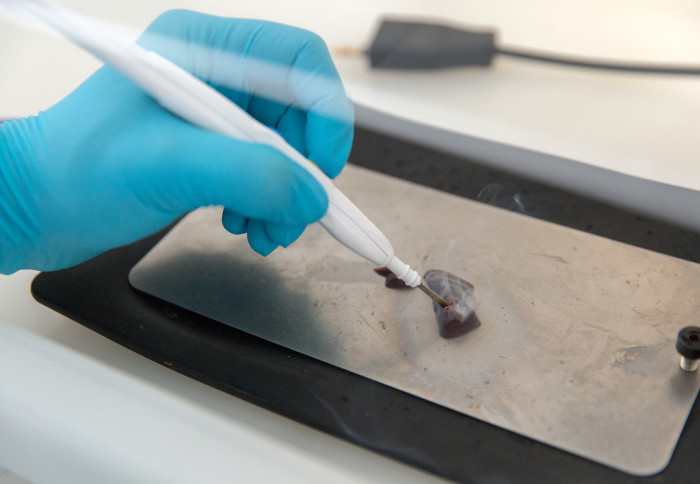New research uses the iKnife to give an immediate diagnosis for womb cancer

New research led by Imperial has found the intelligent knife (iKnife), which “smells tumours”, can be used to diagnose womb cancer within minutes.
Researchers, led by the Department of Surgery and Cancer's Professor Sadaf Ghaem-Maghami and funded by The Eve Appeal, has developed a tool to instantly diagnose or rule out womb cancer. If used in clinic, the intelligent knife (iKnife) technology could provide a diagnosis within minutes for people with abnormal vaginal bleeding.
The iKnife has the potential to completely revolutionise the way we manage women seen in the rapid access clinics, who have been referred with abnormal vaginal bleeding for potential diagnosis of endometrial (womb) cancer. Professor Sadaf Ghaem-Maghami Professor of Gynaecological Oncology
The research, published in Cancer, found that the iKnife can give an immediate, accurate result when testing biopsies taken from the womb lining (endometrium) of women with abnormal bleeding.
It is hoped that this would speed up access to treatment for those with womb cancer. It is also hoped that by providing a diagnosis result within minutes, it could spare many patients the agonising fortnight of anxiety and uncertainty while they wait for the full pathology result to become available.
150 women took part in the research, which took biopsies from the womb using a device called a Pipelle. Researchers then used the iKnife to analyse those samples. The tool works by cutting through tissue whilst delivering an electrical current, heating as it cuts. It then captures and analyses the vapour that is released, using a technique called mass spectrometry to spot any ‘cancer flags’ in the phospholipids in the tissue sample (phospholipids make up the outside of all cells, including cancer cells).
By testing biopsies from women with womb cancer, as well as biopsies from women with benign (non-cancerous) growths, the iKnife’s analysis software has built up a clear picture of what the outside of womb cancer cells are made of. The technology can now detect the phospholipids that are ‘flags’ for cancer and give an instant diagnosis.
The study found that the iKnife can differentiate between normal and cancerous womb tissue with a diagnostic accuracy of 89%. The tool has a specificity of 93% and a positive prediction value of 94%. This means that, when the iKnife made a provisional diagnosis of cancer, this was likely to match the final diagnosis.
Speaking about the research, Professor Sadaf Ghaem-Maghami said: “The iKnife has the potential to completely revolutionise the way we manage women seen in the rapid access clinics, who have been referred with abnormal vaginal bleeding for potential diagnosis of endometrial (womb) cancer. With its high diagnostic accuracy and positive predictive value, we could immediately reassure women of the very low likelihood of having cancer if the iKnife result is negative, and expedite further tests, scans and treatment for women whose biopsies indicate the presence of cancer. This could happen whilst awaiting confirmation from standard pathology.”
Fellow Imperial researcher, Diana Marcus, added: “Everyone knows how stressful it is waiting for a diagnosis of cancer, or waiting for it to be ruled out. The iKnife is an innovative tool that can provide a point-of-care diagnosis for endometrial (womb) cancer, reducing stress and shortening the time to start treatment.”
Womb cancer is the most common of the gynaecological cancers, and the fourth most common cancer in women. It affects 9,300 women and people with gynae organs every year in the UK alone. Increased age is a risk factor for the disease, but womb cancer can affect women at any age – a quarter of women diagnosed with womb cancer are pre-menopausal.
For three-quarters of women with womb cancer who are post-menopausal, the key symptom is vaginal bleeding. Any person experiencing post-menopausal vaginal bleeding should be referred to a clinic, following the urgent two-week referral pathway for suspected cancer. More than 90% of patients attending these rapid access clinics for potential womb cancer do not have cancer. However, being referred for cancer investigations is an understandably stressful experience, even for patients who are ultimately given the all-clear. Previous research shows that women with suspected womb cancer experience high levels of stress and anxiety while being investigated and waiting for test results. For the majority who do not have cancer, the provisional result given by the iKnife could help to provide some much-needed reassurance and peace of mind.
‘Womb cancer has one ‘red flag’ symptom of post-menopausal bleeding that should always get checked out on a two-week referral from your GP. To wait a further two weeks for the results can be really hard for patients,” says Athena Lamnisos, CEO, The Eve Appeal.
“There are many reasons for abnormal vaginal bleeding after the menopause – womb cancer is just one of them. The ability to provide a diagnostic test that rules cancer in or out immediately, and with accuracy, could make such a positive difference,” she explains. “This Eve supported research has the potential to create a step change in faster diagnosis, and for the 90% of women with post-menopausal bleeding that isn’t cancer, a really effective way to put their minds at ease. We know how important this is for patients.”
Point-of-Care Diagnosis of Endometrial Cancer Using the Surgical Intelligent Knife (iKnife)—A Prospective Pilot Study of Diagnostic Accuracy. Marcus D, Phelps DL, Savage A, Balog J, Kudo H, Dina R, Bodai Z, Rosini F, Ip J, Amgheib A, Abda J, Manoli E, McKenzie J, Yazbek J, Takats Z, Ghaem-Maghami S. Point-of-Care Diagnosis of Endometrial Cancer Using the Surgical Intelligent Knife (iKnife)—A Prospective Pilot Study of Diagnostic Accuracy. Cancers. 2022; 14(23):5892. https://doi.org/10.3390/cancers14235892
Some content for this article was taken from The Eve Appeal website.
Article text (excluding photos or graphics) © Imperial College London.
Photos and graphics subject to third party copyright used with permission or © Imperial College London.
Reporter
Benjie Coleman
Department of Surgery & Cancer